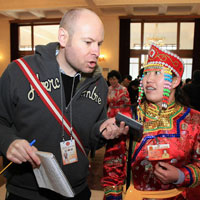两会幕后:“老外”也为“两会”忙
Behind-the-scene heroes 'doing a good job'
[ 2007-03-05 16:01 ]
|
 |
|
A foreign reporter and an
ethnic minority representative at the opening ceremony of the 5th
session of the 10th National People's Congress
(NPC). | When foreign diplomats and reporters
pick up copies of Premier Wen Jiabao's government work report in English,
French, German, Japanese, Russian and Spanish at the opening ceremony of
the 5th session of the 10th National People's Congress (NPC) today in the
Great Hall of the People, they should thank a dozen Westerners for the
wonderful work they have done.
The behind-the-scene
foreigners have been working with about 70 Chinese foreign language
professors for six weeks to translate major reports of the NPC and the
Chinese People's Political Consultative Conference (CPPCC) into the six
languages, Wang Xuedong, deputy chief of the Central Compilation and
Translation Bureau, told China Daily.
Most of them have been in China for quite a long time and have a good
knowledge of the nation's political, economic and social issues, he said.
The practice of having NPC and CPPCC documents translated into foreign
languages started in the 1980s, after China launched its reform and
opening-up policy.
In recent years more and more foreigners are becoming involved in the
handling of the nation's most confidential documents, according to the
bureau official.
"The conventions are becoming more and more transparent and we want to
express ourselves better to the rest of the world," Wang said.
The NPC and CPPCC reports have also been translated into seven ethnic
minority languages including the Kazak, Korean, Mongolian, Tibetan, Uygur
and Yi.
点击查看更多双语新闻
(China Daily)
|
十届人大五次会议今天在人民大会堂开幕,当外国外交官和记者们读到温家宝总理的英、法、德、日、俄和西班牙文六个版本的政府工作报告时,应该要感谢为翻译政府工作报告做了大量工作的外国专家们。
中央编译局副局长王学东在接受《中国日报》的采访时说,这些堪称“幕后英雄”的外国专家和我国约70位外国语教授们一起奋战六周,将"两会"涉及的主要报告翻译成了六种语言。
他说,大多数外专都在中国生活了相当长的一段时间,他们对中国的政治、经济和社会问题已经有了深入了解。
从上世纪80年代我国实施改革开放政策以来,每届“两会”的文件都被翻译成多种外国语言。
据王局长介绍,近年来,越来越多的外国人参与到翻译我国最高机密文件的这一工作中来。
王局长说:“‘两会’越来越趋向于透明化,我们也想更好的向国际社会表达自己。”
此外,“两会”报告还被翻译成了哈萨克语、朝鲜语、蒙古语、藏语、维吾尔族语和彝语等七种少数民族语言。
( 英语点津姗姗编辑)
|
|
|
|
Vocabulary:
behind the scene : 幕后(英雄)
|
|